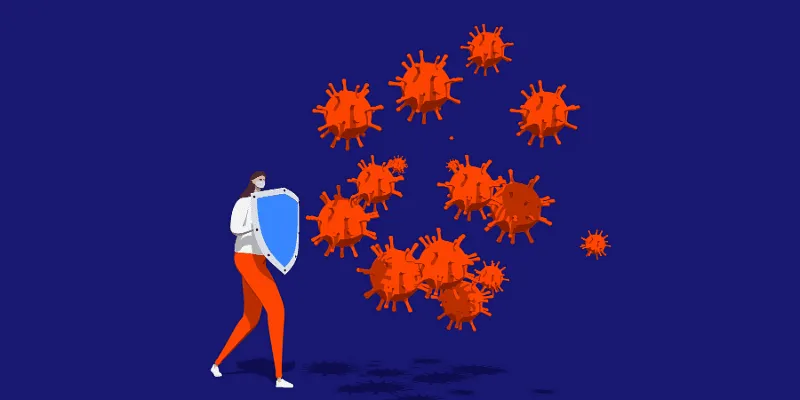How the government can mitigate the threat of COVID-19 for women and girls
There is an urgent need for redistribution of health workforce, capacity building of frontline workers, & strengthening paramedics, which will not only enable accurate prognosis & subsequent referrals to specialists, but also ensure uninterrupted service provision with the limited health workforce.

The Covid-19 pandemic is the biggest health and humanitarian crisis the country has seen since independence. It is wreaking devastating effect on a wide range of areas, including health, economy, employment, social, and professional interactions.
However, as the enormity of the pandemic is unfolding, it is clear that it has significantly affected the poor and marginalised community, who represent nearly two thirds of India’s population.
In the event of a public health emergency such as COVID-19, the poor, homeless, and the marginalised are more vulnerable due to poor nutrition, living in unhygienic conditions, close proximity to people, and exposure to surfaces that may carry the infection. They are therefore doubly at risk - to themselves and to others they might interact with.
It is extremely challenging for the urban poor living in slums, mostly in single rooms with common toilets, to follow the advisory on practicing social distancing, work from home, and self-quarantine in the event of symptoms. It is also very difficult to maintain the required hygiene standards in such a situation.
Moreover, as already evident from media reports, a majority of them who work in the informal sector have lost their livelihoods. This will only further add to their challenges.
However, what has been lost in the chaos among other impacts of COVID-19 is the specific impact on sexual and reproductive health, both for men and women, in the country. The over-burdened public health system is witnessing a diversion of resources, including human resources, leading to shortage of healthcare providers, who can provide the sexual and reproductive healthcare services.
According to the guidelines issued by the Ministry of Health, few essential services under Pradhan Mantri Surakshit Matritva Abhiyan and Village Health, Sanitation, and Nutrition Day (VHSND) remain suspended due to large gathering of beneficiaries, and need for social distancing. In majority of places, the lockdown has led to denying children the to access mid-day meals through the Integrated Child Development Services (ICDS) programme.
The delayed availability of family planning services (such as intra-uterine contraceptive device or IUCD insertion and sterilisation) until routine services resume as well as the restricted movement of ASHAs will make it difficult for women to access reproductive, maternal, and child health (RMNCH) services and commodities.
This in turn will lead to a rise in maternal and new-born mortality, increased unmet need for contraception, and increased number of unsafe abortions and sexually transmitted infections. This phenomenon has been previously witnessed at the time of outbreaks such as Ebola in other parts of the world.
The COVID-19 pandemic has led to an increase in incidences of gender-based violence as well. The economic impact of the 2013-2016 Ebola outbreak in West Africa placed women and children at greater risk of exploitation and sexual violence.
The WHO has already reported a surge in the instances of reported violence in China, the United Kingdom, the United States, and other countries. In India, media reports and voices from civil societies and helplines, including the National Commission of Women (NCW), have reported an increase in the number of cases of domestic violence during the lockdown period.
In its recently released guidelines — Management of Pregnant Women in COVID-19 Pandemic, the Indian Council of Medical Research (ICMR) has cautioned that coronavirus epidemic increases the risk of perinatal anxiety and depression, as well as domestic violence.
It is critically important that support for women and families is strengthened as far as possible; and women are asked about mental health at every contact.
The ICMR has also highlighted that emerging evidence suggests that transmission of coronavirus from mother to baby before birth or during delivery is possible. It is therefore imperative for hospitals to ensure they follow the guidelines and take necessary steps to avoid this possibility of vertical transmission.
In order to ensure uninterrupted supply of contraceptives, the government has recently included family planning goods under the Essential Commodities Act, 1955, and family planning as essential services under the Essential Services Maintenance Act, 1968, following the guidelines of the WHO. This is a much-needed and welcome step. We hope that these services and goods will continue to remain in the essential services list in situations beyond the COVID emergency.
However, the guidelines also invoke emergency responses towards COVID-19 at the expense of other priorities, and can have serious and long-term effects on other aspects of health. Maternal and reproductive health services are at risk of being severely compromised, with the unforeseen burden on the health facilities.
Non-Governmental Organisations (NGOs) and social marketing organisations need to work with the government both by supporting ASHAs in service delivery as well as ensuring availability of SRH commodities.
Counselling services need to be provided through helplines, telemedicine services, community radios, chatbots, and mobile services. There is an urgent need for redistribution of health workforce, capacity building of frontline workers, and strengthening paramedics, which will not only enable accurate prognosis and subsequent referrals to specialists, but also ensure uninterrupted service provision with the limited health workforce.
The government, in consultation with state governments, should come up with a medium and long-term strategy, and plan to invest in and build a resilient public health system to provide core public health, prevention, and curative functions to effectively address the impact of COVID-19 and future disease outbreaks.
Edited by Megha Reddy
(Disclaimer: The views and opinions expressed in this article are those of the author and do not necessarily reflect the views of YourStory.)






![[App Fridays] TikTok lovers, are you ready for Firework, the new short video platform in town?](https://images.yourstory.com/cs/2/a182c7e0140711e987e2f7248b252f46/Firework1571401406063png?mode=crop&crop=faces&ar=1%3A1&format=auto&w=1920&q=75)

